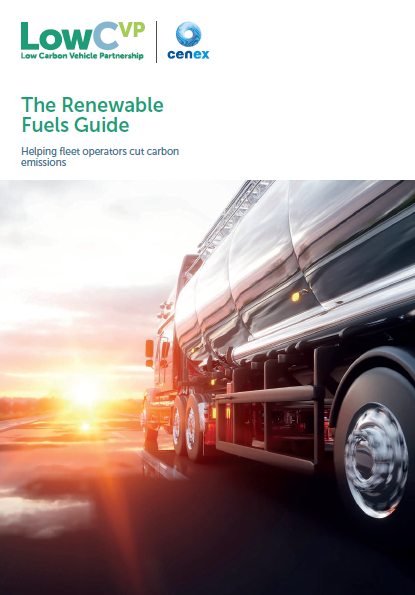LowCVP launches new commercial fleet guide
A new guide for fleet operators shows how renewable fuels can immediately cut greenhouse gas emissions in road transport, particularly from commercial vehicles for which few low emission solutions are currently available.
A new guide for fleet operators shows how renewable fuels can immediately cut greenhouse gas emissions in road transport, particularly from commercial vehicles for which few low emission solutions are currently available.
While the focus has been mainly on vehicle electrification for meeting the UK’s net zero target as it applies to road transport, the LowCVP argues that there are still major technical challenges to be overcome to electrify the commercial vehicle sector and, in particular, longer distance road freight.
HGVs currently produce approximately 15 per cent of total road transport greenhouse gas emissions (GHGs) with a similar contribution coming from light duty vans. Vehicles with long-haul duty cycles account for the largest portion of GHG emissions from HGVs.
The Renewable Fuels Guide, produced by the LowCVP alongside Cenex, shows how the adoption of renewable fuels from sustainable feedstocks offers one of the most rapid, and economically viable, routes to lowering emissions for such vehicles, both new and those already in service.
The guide provides fleet operators with an overview of the range of low carbon and sustainable fuels currently available in the UK, with a focus on high blend biofuels for use in commercial vehicles. It demonstrates the business and environmental case for their adoption, featuring a series of fleet operator case studies.
The guide highlights the opportunities for the introduction of renewable fuels including biodiesel, biomethane, biopropane and hydrotreated vegetable oil and covers case studies from organisations including McDonalds; McGregor Logistics; London Borough of Hackney; Luckett’s Travel; John Lewis Partnership; London Borough of Camden; Cornwall Council and Kuehne+Nagel.
Gloria Esposito, LowCVP’s head of Projects, said: “The next decade is going to be critical for mitigating road transport greenhouse gas emissions if we are to meet the 2050 net zero target. Public and private sector fleet operators are under growing pressure to reduce the carbon footprint of their own activities and those of their suppliers. Renewable fuels can provide an immediate and cost-effective solution to achieving such savings, especially for HGV fleets.
“Low carbon and sustainable fuels have an important role to play in the near and medium-term to reduce emissions from the commercial vehicle sector, particularly as electric and hydrogen fuel cell solutions in these applications present significant challenges and are at early stages of development.”
Source: https://greenfleet.net
FLEET MANAGEMENT AUDIT
Fleet management is the use of a set of vehicles in order to provide services to a third-party, or to perform a task for our organization, in the most efficient and productive manner with a determined level of service and cost.
Fleet management activities are shown in the following graph 1:

Graph 1: fleet management activities
The proposal audit analyses and assesses all fleet management activities shown in the graph 1, and its main goals are:
- Know the overall status of the fleet management activities
- Provide the analysis, the assessment, the advice, the suggestions and the actions to take in order to cut costs and increase the efficiency and efficacy of the fleet management activities
With the information obtained, we’ll elaborate a report that holds the overall status of the fleet management as well as the suggestions, recommendations and the measures to take in order to cut costs and optimize the fleet management activities.
CLICK ON THE FOLLOWING LINK TO DOWNLOAD THE PROPOSED FLEET MANAGEMENT AUDIT:



